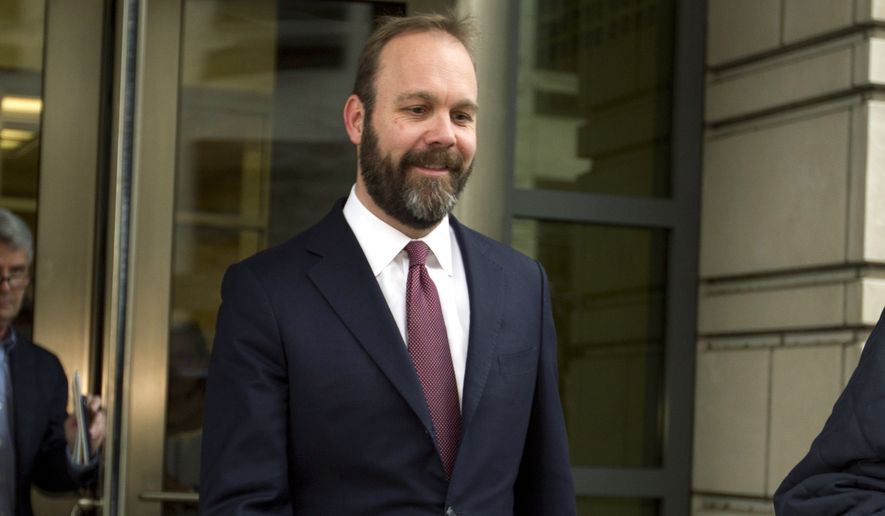Roger Stone’s lawyers gambled that a scratchy, barely audible recording of his testimony to Congress will keep the longtime GOP operative out of prison as both sides rested their cases Tuesday.
Jurors will hear closing arguments Wednesday before being sent off to reach a verdict.
The defense concluded its case without calling a single witness, including Mr. Stone. Instead, they played a 90-minute clip of his 2017 testimony before the House intelligence committee’s hearing on possible collusion between Russia and Donald Trump’s 2016 presidential campaign.
Prosecutors say Mr. Stone lied at that hearing about his efforts to contact WikiLeaks to learn more about the organization’s release of hacked emails damaging to Hillary Clinton’s 2016 presidential campaign. Mr. Stone is also accused of obstruction and pressuring another witness to lie to the committee.
If convicted, Mr. Stone, 67, could face 20 years in prison. He told the court it was his decision not to take the stand.
Mr. Stone’s lawyers filed a motion for acquittal on all but the witness-tampering charge Tuesday, arguing the government has not proven its case.
“The government’s case is built on answers to questions that were not false, but rather answers that were true,” his attorneys wrote in the 14-page motion that will be reviewed by Judge Amy Berman Jackson.
Defense attorneys played the recording to bolster that argument. They have argued the committee misled Mr. Stone, who believed he was only going to testify about Russian election meddling and not WikiLeaks.
The crackling audio recording was difficult to understand in some portions as voices from the hearing faded in and out. Jurors appeared deadpanned as they strained to listen.
Mr. Stone denied that he ever communicated with WikiLeaks or discussed the hacked emails with President Trump.
Rep. Adam B. Schiff, California Democrat, pressed Mr. Stone on whether he had phone calls, emails or texts relevant to the investigation.
“That is correct … I believe we have fully complied with your request,” Mr. Stone said.
Those statements contradict testimony earlier in the day from Rick Gates, the deputy chairman of Mr. Trump’s 2016 presidential campaign.
Mr. Gates told jurors that Mr. Stone updated key campaign officials, including campaign chairman Paul Manafort and Mr. Trump himself, about WikiLeaks’ activities.
Mr. Gates said he overheard a phone call in late July 2016 between Mr. Stone and Mr. Trump that he believed involved WikiLeaks. Although he conceded that he did not hear what Mr. Stone said during the call, he thought it related to WikiLeaks because after he hung up, Mr. Trump said: “more information would be coming.”
That testimony appears to belie Mr. Trump’s written answers last year to former special counsel Robert Mueller. The president said he did not recall receiving any information about WikiLeaks or ever discussing WikiLeaks with Mr. Stone.
At least one Democrat noticed the discrepancy. Sen. Ron Wyden of Oregon said Mr. Gates’ testimony underscores Mr. Trump’s willingness to accept foreign help to win an election.
“Rick Gates today provided blockbuster testimony indicating that Donald Trump lied under oath when he told Special Counsel Mueller that he did not recall discussing with Roger Stone the release of emails stolen by Russian intelligence officials during the 2016 campaign,” Mr. Wyden said in a statement. “Gates painted a picture of a campaign that was not only informed about the release of stolen emails, but coordinated its campaign around those releases.”
Congressional democrats are closely watching the Stone trial as the impeachment inquiry rages on just blocks from the courthouse.
Mr. Gates said Mr. Stone was the only person passing information about WikiLeaks to the campaign. It appeared that the longtime Trump confidant had some connection to WikiLeaks based on the information being fed to the campaign, Mr. Gates said.
“Mr. Stone never indicated where he got the information, but I did not believe it was public information. I believe he had other sources he was getting the information from,” Mr. Gates said.
The campaign was elated as it learned from Mr. Stone that WikiLeaks was publishing damaging information about Mrs. Clinton.
“It was in a way a gift,” Mr. Gates said, later adding, “we were kind of in disbelief. We believed that if information were to come out … there were a number of us that felt that it would give our campaign a leg up.”
• Jeff Mordock can be reached at jmordock@washingtontimes.com.




Please read our comment policy before commenting.